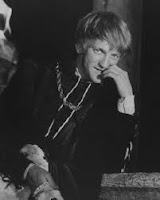Wolf Solent: Classics Challenge
Katherine posted this month's prompts at for the Classics Challenge over a week ago, but I'm only just getting now to the point where I have anything to say! I'm choosing to answer her Level 1 questions:
What phrases has the author used to introduce this character? What are your first impressions of them? Find a portrait or photograph that closely embodies how you imagine them.
I'm reading John Cowper Powys' 1929 novel Wolf Solent (a hefty tome at over 600 pages, and the sort of dense writing that needs attention - though it also rewards it). The eponymous hero is described as follows:
Solent was not an ill-favoured man; but on the other hand he was not a prepossessing one. His short, stubbly hair was of a bleached tow-colour. His forehead as well as his rather shapeless chin had a tendency to slope backward, a peculiarity which had the effect of throwing the weight of his character upon the curve of his hooked nose and upon the rough, thick eyebrows that over-arched his deeply-sunken grey eyes.
He's not an ambitious man, but he nurses an arrogance which is borne of what he calls his "mythology", a sense of involvement in a cosmic struggle because he - uniquely? - is in tune with some sort of earthforce which resembles:
great vegetable leaves over a still pool - leaves nourished by hushed noons, by liquid, transparent nights, by all the movements of the elements - but making some inexplicable difference, merely by their spontaneous expansion, to the great hidden struggle always going on in Nature between the good and the evil forces.
Solent is preternaturally aware of his surroundings, so that they intrude almost irritatingly on the reader - in part, perhaps, because it's a kind of writing which seems very oldfashioned now. Those vegetable leaves would seem very overblown to the modern sensibility, used to a much sparser style. I can't think I'd tolerate them in anyone more recent than Iris Murdoch (who admired Powys). But Wolf Solent was written in the twenties, and a little personal melodrama was more acceptable then.
I'm not sure that I find Wolf Solent very appealing, but I did manage to cast him fairly fast, recalling John McEnery as Mercutio in the Zefirelli Romeo and Juliet (also stunning in the first TV adaptation of Our Mutual Friend and in Bartleby). He's right not only in appearance, but in his intensity - in fact, Solent has something of the quality of all those characters, but where Bartleby eschewed all contact, Wolf Solent wants now to embrace new experience and reality, even at the risk of his secret life. At thirty-five, he has left his tedious London existence, and life with his mother, to take up a new post on Dorset, in the village where his parents grew up. Returning to his roots, and to the countryside, is important to his nature mysticism, so we know that the move is likely to shake him to the core - as he travels to Dorset he dreams of finding a young woman, "tall and slim and white", who will let him make love to her out of doors.
By page 63 I feel I'm only just beginning to see Wolf Solent as a person. Of course, he's at something of a disadvantage at the moment - the uncertainty of a new job, a new home (with some rather odd fellow residents), and a new employer who has already described Solent's predecessor's death as a "betrayal", which would surely raise the odd concern....I feel I'm as much on a journey of exploration as our hero; surely there will be revelations about his parents, and we've already met a young woman.
There will be another post on Wolf Solent in due course - I think it will keep me going for some time!



Wow, that's a lotta pages. I'm not sure I'd stay with this one, but I'll be interested to see how it goes.
ReplyDeleteI've not heard of this author or book. I like the description of the character.
ReplyDeleteI've read Maiden Castle and another I can't remember the name of. They are certainly dem thick books but more memorable than one expects.
ReplyDelete